





Understanding Impulsive Behavior: Social Story with Coping Strategies
₹80
₹160
50% off
0 (0 ratings)
Grade Levels
Pre-K - Grade 3 (Ages 4-8)
Content Overview
Format: Printable PDF, Total Pages: 11, Features: Engaging social story with real pictures and 6 interactive activities.
Categories
Pages from the Resource
Help children understand and manage impulsive behavior with this engaging social story and activity set. Designed for kids with autism, ADHD, and special needs, this printable resource teaches self-regulation, patience, and decision-making. Includes a relatable first-person story and six interactive activities such as vocabulary, comprehension, spelling, role-play, and creative exercises to reinforce learning.

Page 1

Page 2
What Users Say
0
0 ratings
5
0+
4
0+
3
0+
2
0+
1
0+
5 Stars
Product is Good to use.
9 months ago
Varsha Parent
Similar Products
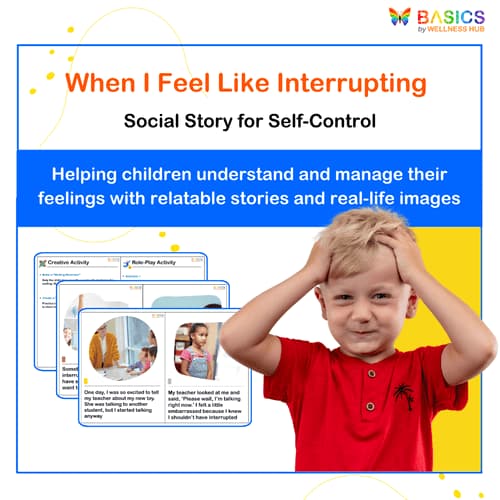
When I Feel Like Interrupting – Social Story for Self-Control
₹ 80.00
₹ 160.00
50% off
4.8 (60 ratings)
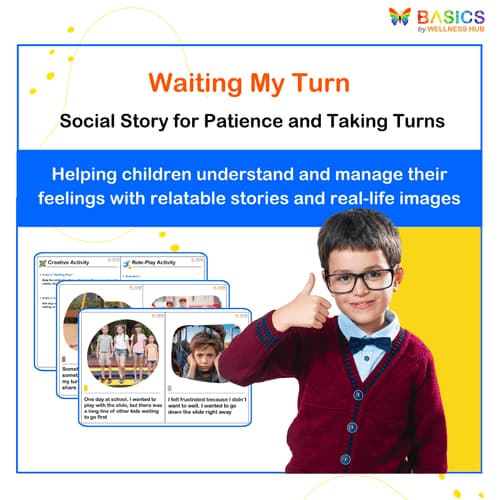
Waiting My Turn – Social Story for Patience and Taking Turns
₹ 80.00
₹ 160.00
50% off
4.7 (56 ratings)
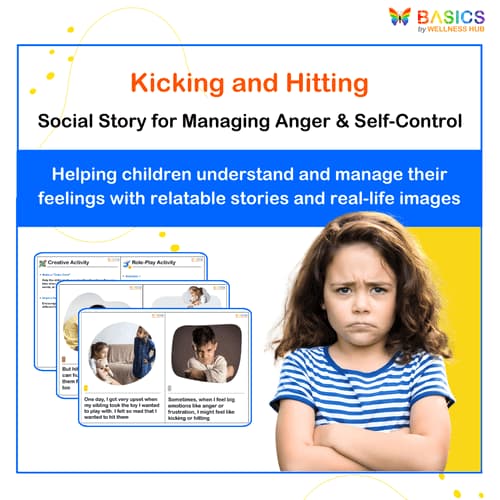
Kicking and Hitting – Social Story for Managing Anger & Self-Control
₹ 80.00
₹ 160.00
50% off
4.6 (52 ratings)
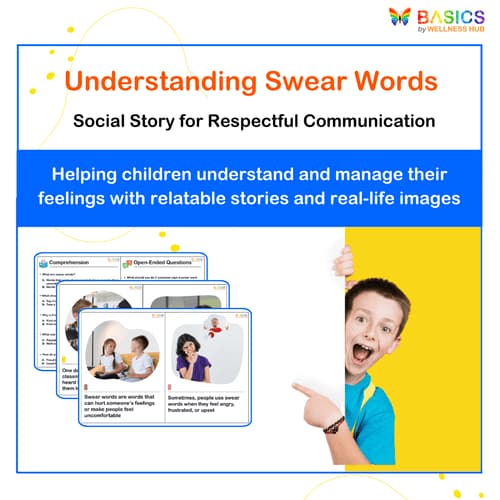
Understanding Swear Words – Social Story for Respectful Communication
₹ 80.00
₹ 160.00
50% off
4.9 (48 ratings)
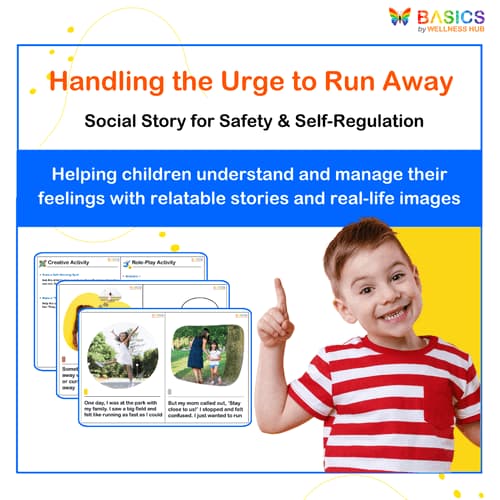
Handling the Urge to Run Away – Social Story for Safety & Self-Regulation
₹ 80.00
₹ 160.00
50% off
4.8 (44 ratings)
About the Product
Impulsivity is a common challenge for many children, especially those with special needs, ADHD, or autism. This Understanding Impulsive Behavior social story is designed to help children recognize and manage impulsive actions in a structured and supportive way. By using real-life scenarios, engaging visuals, and clear first-person storytelling, this resource guides children in understanding what impulsive behavior is, why it happens, and how they can develop better self-regulation skills.
With a focus on self-awareness, decision-making, and emotional regulation, this social story encourages children to pause and think before acting. It provides an easy-to-follow structure that helps them navigate impulsive urges in social, academic, and everyday situations, making it a valuable tool for parents, educators, and therapists.
Product Details
- Format: Printable PDF
- Total Pages: 11
- Content:
- Social Story (16 segments) – Real-life images and first-person storytelling to teach about impulsivity.
- Vocabulary Activity – Learn 5 key words with meaning-based options.
- Spelling Activity – Practice spelling with 8 pairs of words.
- Comprehension Activity – 5 multiple-choice questions reinforcing key lessons.
- Open-Ended Questions – Encourage self-reflection with real-life applications.
- Creative Activity – Interactive drawing and poster-making for better understanding.
- Role-Play Activity – Scenario-based role-playing for practicing self-regulation.
- Target Audience: Children (Ages 4-10), including those with autism, ADHD, and special needs.
Recommended Use: Home, school, or therapy settings for teaching impulse control and self-regulation.
Educational Benefits
This social story provides a structured and interactive way for children to develop impulse control and emotional self-regulation. Key benefits include:
- Improved Self-Control – Helps children recognize when they are acting impulsively and learn strategies to pause and think before reacting.
- Enhanced Social Skills – Encourages children to develop patience, take turns, and make thoughtful choices in social situations.
- Emotional Awareness – Teaches children to understand why they feel impulsive, what triggers their behavior, and how to manage it effectively.
- Practical Problem-Solving – Through comprehension questions and role-playing activities, children practice decision-making in real-life scenarios.
- Engaging and Interactive Learning – The mix of storytelling, visuals, vocabulary-building, and creative exercises ensures a multi-sensory learning experience.
This resource is especially helpful for children who struggle with blurting out, acting before thinking, interrupting, or difficulty waiting for their turn.
Instructions for Use
- Read the Social Story Together – Start by reading the story slowly and clearly, encouraging the child to follow along and observe the real-life images.
- Discuss the Key Messages – Ask open-ended questions like: Have you ever acted before thinking? What happened? This promotes self-reflection and awareness.
- Engage in Activities –
- Vocabulary & Spelling – Build comprehension of key impulse-control words.
- Comprehension Questions – Reinforce the lessons with multiple-choice questions.
- Creative Activity – Encourage children to draw or create a poster about making better choices.
- Role-Play Activity – Act out scenarios where children can practice impulse control in real-life situations.
- Apply to Real-Life Scenarios – Encourage children to use calm-down strategies when they feel an impulse. Examples include counting to five, deep breathing, or asking for help.
- Repeat and Reinforce – Impulse control takes time! Revisit the story regularly to help reinforce learning and encourage self-regulation over time.
This resource is a valuable tool for parents, teachers, and therapists looking to support children in building better self-control and social awareness.
Activities Using the Resource
This resource includes multiple activities designed to reinforce the key concepts of impulse control, self-regulation, and thoughtful decision-making in an interactive and engaging way.
1. Vocabulary Activity
Objective: Build an understanding of important words related to impulsivity and self-control.
- The child is presented with 5 words from the social story.
- Each word has two possible meanings, and the child must select the correct one.
- Example:
- Impulse
- A: Doing something quickly without thinking. ✅
- B: Waiting patiently before making a choice. ❌
- Impulse
2. Spelling Activity
Objective: Improve literacy skills while reinforcing key concepts.
- Includes 8 word pairs from the social story for the child to identify the correct spelling.
- Helps build familiarity with words related to self-regulation, such as "impulse," "think," "pause," and "calm."
3. Comprehension Activity
Objective: Reinforce learning by testing the child's understanding of the story.
- Includes 5 multiple-choice questions based on the story.
- Example Questions:
- What is an impulse?
- A: Doing something quickly without thinking. ✅
- B: Waiting patiently before making a choice. ❌
- What can help me when I feel like acting impulsively?
- A: Taking deep breaths. ✅
- B: Running away. ❌
- What is an impulse?
4. Open-Ended Questions
Objective: Encourage self-reflection and help children relate the story to their own experiences.
- Example Prompts:
- Can you remember a time when you acted without thinking? What happened?
- What can you do instead of interrupting someone when they are talking?
- How can you remind yourself to think before acting?
5. Creative Activity
Objective: Use artistic expression to deepen understanding.
- Draw My Calm Strategy – The child draws or writes about what helps them pause and think before acting impulsively.
- Impulse Control Poster – Encourage the child to create a poster with their own "pause and think" rules to help them remember strategies for controlling impulsive behavior.
6. Role-Playing Activity
Objective: Practice impulse control in real-life social situations.
- Act out scenarios where the child must choose between an impulsive reaction and a thoughtful response.
- Example Scenarios:
- A child wants to grab a toy from a friend—what should they do instead?
- Someone is talking, and the child wants to interrupt—what’s the better way to handle this?
These activities make learning interactive, engaging, and applicable to everyday life, ensuring children retain the key lessons from the social story.
FAQs
Q1. What is the purpose of this social story?
This social story helps children understand impulsive behavior, why it happens, and how to manage it using simple strategies. It provides real-life scenarios and activities to teach self-control, patience, and thoughtful decision-making.
Q2. Who is this resource for?
This social story is ideal for:
- Children ages 4-10 who struggle with impulsivity.
- Children with ADHD, autism, or special needs who need structured guidance on impulse control.
- Parents, teachers, and therapists looking for a practical tool to teach self-regulation.
Q3. How can I use this resource at home or in the classroom?
- Read the story with the child and encourage discussions about their experiences.
- Use the comprehension activities to reinforce learning.
- Engage in role-playing exercises to practice impulse control in real-life situations.
- Create a "Pause and Think" poster as a daily reminder of self-control strategies.
Q4. Does this resource help children with autism or ADHD?
Yes! This social story is designed to support children with special needs, including autism and ADHD. It provides structured guidance, visual learning, and interactive activities that help children develop better impulse control and decision-making skills.
Q5. Can this resource be used in a therapy setting?
Yes, speech therapists, occupational therapists, and behavioral therapists can use this resource to teach impulse control strategies through storytelling, discussions, and interactive activities.
Q6. Is this a printable resource?
Yes! This is a printable PDF that can be used digitally or as a printed booklet.
Usage Rights and Restrictions
- ✅ Allowed Uses:
- You can print multiple copies for personal, classroom, or therapy use.
- You can laminate the pages for durability and reuse them with multiple children.
- You may use this in online therapy sessions with children.
- ❌ Not Allowed:
- You may not resell, redistribute, or modify the resource for commercial purposes.
You may not upload this resource to other websites or share it in groups without permission.
Conclusion
Understanding Impulsive Behavior Social Story is a powerful tool to help children recognize and manage impulsivity. By using relatable storytelling, engaging visuals, and interactive activities, this resource teaches children how to pause, think, and make better decisions in their daily lives.
Whether used at home, in a classroom, or in a therapy session, this social story provides practical strategies for self-regulation, emotional awareness, and improved social skills.
This is an essential resource for any parent, teacher, or therapist looking to help children develop better impulse control and thoughtful decision-making skills in an engaging and supportive way.



